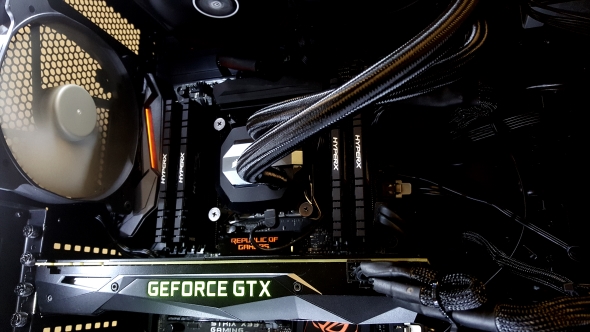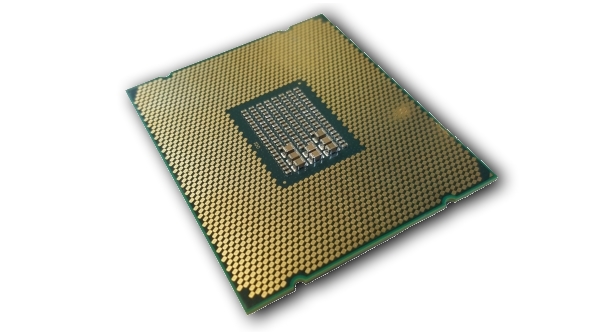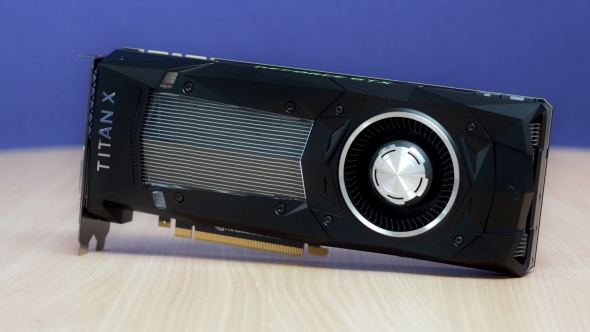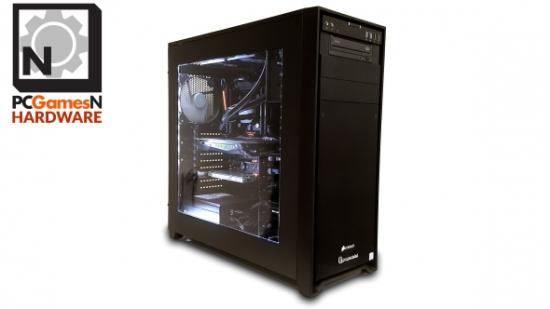The latest Nvidia GTX Titan X is a giant of a graphics card, but there are only two ways to bag yourself one. Either pick one up from Nvidia’s own store or go the whole piglet and buy a hyper-powered system like this one from PC Specialist.
Can’t stretch to a Titan X for your machine? Check out our pick of the best graphics cards for something a little more reasonable.
There is a third way, but it’s far more nefarious, involves a little voodoo, a sacrificial 8800GT and a touch of light cannibalism. But we won’t go into that. Suffice to say dropping £2,999 on the PC Specialist Hydra X is by far the easier method and will leave your eternal soul more or less intact.
The Hydra X is very much a no-nonsense gaming rig and that’s to its immense credit. It knows you’re here for the component combination and not for some elaborate RGB lighting system and doesn’t waste effort, or your money, on extraneous extras.
Click on the quick links below to go straight to the performance or verdict sections.
PC Specialist Hydra X specs

The Hydra X has been specced out with some of the finest PC kit around right now and will be a build that’s going to stand the test of gaming time for many a year to come. Obviously a good part of that is down to the fact that PC Specialist were one of the few manufacturers able to offer the fastest consumer graphics card known to (hu)man at launch.
The Pascal-based Titan X is a £1,100 graphics card on its own, which makes the specs list all the more impressive given the price against the sort of high-end rigs we’ve tested recently. It’s also one of the only GPUs that can lay claim to genuine 4K gaming performance at top settings. It’s that no-compromise approach to modern 4K gaming which almost makes it worth the cash…almost.
But just because the Hydra X has got the fastest GPU around that doesn’t mean PC Specialist have skimped on the rest of its components. The Intel Core i7 6850K is a high-end six-core, 12-thread processing monster and the slightly upgraded sibling to the i7 6800K we checked out a few months back.
The 6850K has got a little more about it in terms of straight clockspeed, with a base and Turbo configuration of 3.6GHz and 3.8GHz respectively, but the big difference between it and its cheaper brethren is the number of native PCIe 3.0 lanes it can call its own. The 6800K comes with 28 lanes while the 6850K has the same 40 lane setup as the ludicrously expensive 10-core 6950X.
So if you wanted to add a second Titan X, Mr. Moneybags, you could have them both running across the full 16 lanes and still have more than enough left over for a nice PCIe-based SSD to get involved. Which is lucky because PC Specialist have dropped an Intel 750 SSD into the mix – a super-quick 400GB NVMe drive. It doesn’t quite have the lightning pace of the brilliant Samsung 960 Pro, but it’s still got some legs.
Backing all that up is 32GB of Kingston HyperX memory running at a speedy 3,200MHz and all arrayed in full quad-channel DDR4 formation. Mmm, RAM. Sexy stuff.
PC Specialist Hydra X benchmarks


PC Specialist Hydra X performance

It makes sense to start with the gaming performance of the Hydra X, mostly because, y’know, ‘game’ is practically our middle name, but also because the Titan X inside it is the most powerful gaming GPU we’ve ever tested. That’s born out by the Hydra X’s performance at both 1440p and at 4K, where only the DinoPC Raptor2 can better it. And that’s only because it’s sporting a pair of GTX 1070 cards and is another £800 more expensive because of it.
Even then there are times where the PC Specialist rig is still able to post faster gaming frame rates. And that’s because of SLI flakiness raising its buck-toothed, wall-eyed, drooling head once again. Bloody multi-GPU inbreeding. When a pair of graphics cards from the same family bump uglies it rarely makes for beautiful results.
And this is why Nvidia’s Titan cards have always been able to justify themselves in the face of either SLI setups or dual-GPU graphics cards. It’s always, always, preferable to have one fast graphics card over a pair of slower ones jury-rigged together. We’ve been promised multi-GPU in DX12 will alleviate those problems, but that’s still far from a universal solution. A single Titan X is, no matter what API you’re running.
But, while the gaming performance is indeed fantastic, that’s not the only thing the Hydra X has got going for it. The Core i7 6850K is a mighty six-core CPU and running at its stock clockspeeds is as quick as the overclocked i7 6800K Cyberpower kitted out the HL 700 with. And if you feel you need some extra CPU power the Corsair H100i v2 cooler attached to the 6850K will allow you to get busy with the clock tweaks yourself. You’re unlikely to need to though, unless you’re planning on running some kinda rendering farm with your shiny new rig.
The Hydra X is also mighty quick in the storage stakes too, with the Intel 750 PCIe able to chew through finicky file sorting with ease. The MSI Aegis X’s RAID’d SSDs deliver quicker straight line sequential read speeds, but with 400GB at its disposal the Intel drive has a much greater capacity to match its speed.
PC Specialist Hydra X verdict

This is probably going to read like a pretty ridiculous statement to most of you, but I’m going to make it nonetheless: the Hydra X, at £2,999, is pretty damned good value. I’m well aware that’s a lot of money to drop on a full PC – hell, it’s more money than I’ve ever spent on a car – but considering the competition and the components inside the pricetag is actually rather justifiable.
Obviously the GTX Titan X is the headline component, and that alone makes up for over a third of the ticket price, but the rest of the build has been beautifully balanced to ably support the super-speedy GPU. The Intel SSD is a quality NVMe drive, the huge amount of memory is going to be more than enough for the foreseeable future and the hefty six-core, 12-thread processor is going to be all the CPU you need for the next five years. At least.
And that’s the whole point of dropping £3K on a fully built PC. This is going to be a system which barely needs you to touch it and it will keep producing the gaming goods for year to come. Though the sad truth though is it’s probably Nvidia’s Titan X which will need replacing before anything else in PC Specialist’s Hydra X. But then such is the way of chasing the PC hardware dragon.
